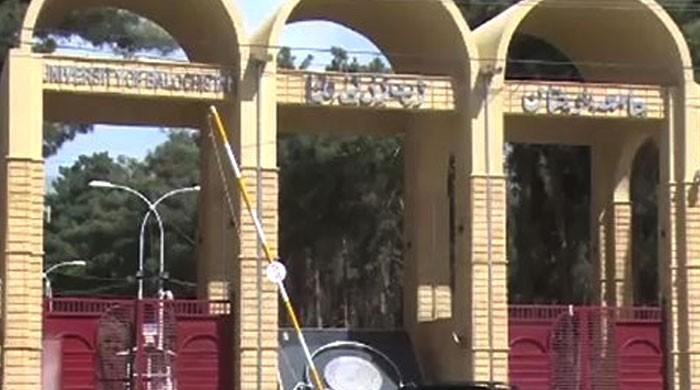Democratizing higher education
On Monday, a blackmailing scandal at University of Balochistan (UOB) shocked the entire country. According to reports, the security staff of the university had installed secret cameras with which they used to record candid videos of students to then blackmail them.
Most of the victims were female and they were repeatedly sexually harassed by the blackmailers. This revelation was more shocking in the context of Balochistan where respect for women, until now, used to be the main pillar of society.
The news of this scandal went viral on social media and news channels also gave it coverage. In response, the officials of the government of Balochistan came out from hibernation and announced that they would hold the culprits responsible. The Federal Investigation Agency (FIA) is investigating the matter and will submit its report by the end of this month. However, this crisis is not just a matter of abuse of power by the security staff of the UOB. It reflects the brewing crisis in higher education in Balochistan.
There are four public-sector universities in Quetta and all get media attention from time to time for the wrong reasons. Bolan University of Medical and Health Sciences (BUMHS) was under criticism a couple of weeks ago when the female house officers of the university were forcefully evicted from their hostels. The uncivilized treatment meted out to them by the administration was recorded on camera and so ended up creating a lot of noise on social media. In the past, candidates attempting medical entry test have protested numerous times against irregularities in the test.
Likewise, Sardar Bahadur Khan Women’s University (SBKWU) is often in the news. Last year, the Balochistan government constituted an inquiry committee to probe sexual harassment complaints at the university. Before that there was a case of food poisoning of hostel students of the SBKWU due to mismanagement by the administration. As usual, nothing came out of the inquiries due to a culture of impunity in the province.
Furthermore, there have been many protests against the vice-chancellor (VC) of the Balochistan University of Information Technology, Engineering and Management Sciences (BUITEMS), who is holding his position for more than a decade.
In the most backward province of Pakistan, higher education institutes are in the news more for protests by students than academic progress. The reason for this severe crisis in higher education is lack of accountability in this sector. In Balochistan, all public universities are under the control of just one person – the governor of the province. Since the office of the governor is not accountable to the provincial assembly, higher education institutes are also not accountable to the public.
After the 18th Amendment, the office of the governor was reduced to a symbolical representative of the federal government. There is nothing much the governor can do apart from meeting people and administering oath to cabinet members and judges. Still, in Balochistan, the office of the governor is used as a political prize and hence it needs to have some sort of authority. That is why the provincial government of Balochistan in the last nine years has not formed a provincial higher education commission to take control of public universities. Sindh and Punjab have acquired control of their public universities by forming provincial higher education commissions after the 18th Amendment.
In this context, what is needed is to democratize higher education institutes in Balochistan. The way forward to achieving this end is to establish a provincial higher education commission in the province. This commission will take control of the public universities and the office of the governor will no longer be able to control them. This is not an easy decision to take but the government of Jam Kamal in Balochistan, which claims to reform governance in the province, should be able to take this decision if they really want reforms in the higher education sector.
The suggested provincial higher education commission should comprise educationists with impeccable reputation and not political appointees. Such academics can run the higher education sector of Balochistan in a better way as compared to the office of the governor. This commission should then be answerable to the provincial assembly, which is the representative of the people of the province.
Moreover, for the sake of reforms in Balochistan, this commission should limit the tenures of VCs of universities. Ideally, all VCs should be appointed for just one tenure, and extension of just one tenure should be provided in extraordinary circumstances. This will result in a culture of accountability in public universities because one person will not be holding the position of VC forever.
Lastly, the recent scandal in the UOB has revealed that there is a dire need to develop a robust anti-sexual harassment mechanism in the province. Although laws have been passed to this end, apparently there is no effective implementation.
The government of Balochistan should establish a body through which women can file complaints of sexual harassment they face anywhere, be it government offices or public universities.
The writer is a journalist and researcher based in Quetta.
Email: Adnan.Aamir@Live.com
Twitter: @iAdnanAamir.
-
 Cardi B Finally Responds To Accusations About Destroying 'SNL' Set After Nicki Minaj Joke
Cardi B Finally Responds To Accusations About Destroying 'SNL' Set After Nicki Minaj Joke -
 Gorton And Denton By-election Result: Green Party Defeats Labour In Blow To Keir Starmer
Gorton And Denton By-election Result: Green Party Defeats Labour In Blow To Keir Starmer -
 Jack Dorsey Cuts 4,000 Roles, Says AI Requires Smaller Teams
Jack Dorsey Cuts 4,000 Roles, Says AI Requires Smaller Teams -
 Reggie Bannister Health Takes ‘difficult Turn’ Amid Dementia, Parkinson’s Battle
Reggie Bannister Health Takes ‘difficult Turn’ Amid Dementia, Parkinson’s Battle -
 'Humble Traitor' Rob Rausch Makes Unexpected Move After Betraying Maura Higgins In Season 4
'Humble Traitor' Rob Rausch Makes Unexpected Move After Betraying Maura Higgins In Season 4 -
 Sarah Ferguson Drops An Accusation Against Andrew? ‘He Just Wants Leverage’
Sarah Ferguson Drops An Accusation Against Andrew? ‘He Just Wants Leverage’ -
 Anthropic Rejects Pentagon Military AI Proposal, Holds Firm On Safety Guardrails —What’s Next?
Anthropic Rejects Pentagon Military AI Proposal, Holds Firm On Safety Guardrails —What’s Next? -
 'Traitors' Reunion Drama: Rob Rausch Defends Strategy, Makes Shocking Revelation After Victory
'Traitors' Reunion Drama: Rob Rausch Defends Strategy, Makes Shocking Revelation After Victory -
 Inside Hillary Clinton’s Epstein Testimony: Key Takeaways And Highlights Explained
Inside Hillary Clinton’s Epstein Testimony: Key Takeaways And Highlights Explained -
 'Too Hard To Be Without’: Woman Testifies Against Instagram And YouTube
'Too Hard To Be Without’: Woman Testifies Against Instagram And YouTube -
 Kendall Jenner Recalls Being ‘too Stressed’: 'I Want To Focus On Myself'
Kendall Jenner Recalls Being ‘too Stressed’: 'I Want To Focus On Myself' -
 Ethel Kennedy’s 34 Grandchildren And The Expanding Kennedy Family Legacy
Ethel Kennedy’s 34 Grandchildren And The Expanding Kennedy Family Legacy -
 Dolly Parton Achieves Major Milestone For Children's Health Advocacy
Dolly Parton Achieves Major Milestone For Children's Health Advocacy -
 'The White Lotus' Creator Mike White Calls 'Survivor' Fans 'sadistic'
'The White Lotus' Creator Mike White Calls 'Survivor' Fans 'sadistic' -
 Oilers Vs Kings: Darcy Kuemper Pulled After Allowing Four Goals In Second Period
Oilers Vs Kings: Darcy Kuemper Pulled After Allowing Four Goals In Second Period -
 Calgary Weather Warning As 30cm Snow And 130 Km/h Winds Expected
Calgary Weather Warning As 30cm Snow And 130 Km/h Winds Expected





